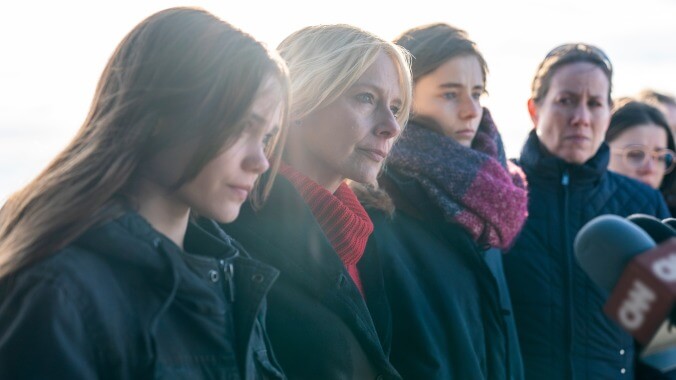There’s a hint of an even more fascinating story in Netflix’s true-crime drama Lost Girls

Who are the lost girls in Lost Girls, a righteously angry drama adapted from Robert Kolker’s nonfiction book about the Long Island serial killer? (Both book and movie bear the subtitle An Unsolved American Mystery, letting you know right up front that a neat little bow won’t be wrapped on this story.) The answer would seem to be obvious, since at least 10 possible victims have been found, virtually all of them female sex workers who’d simply disappeared. What’s both intriguing and frustrating about the screen version, however, is the way that it flirts with a much thornier and potentially richer possibility, only to ultimately back away from that idea in favor of a straightforward plea for justice. Perhaps that’s to be expected, since this is the narrative debut of longtime documentary filmmaker Liz Garbus (The Execution of Wanda Jean, Bobby Fischer Against The World), who presumably chose fact-based material for a reason. Still, she comes tantalizingly close to pushing past the basics and delving into a character’s messy psyche.
That also requires a first-rate actor, and Garbus here gives Amy Ryan perhaps her meatiest role since Gone Baby Gone (for which she should have won the Oscar). Ryan plays Mari Gilbert, a single mother whose eldest daughter, Shannan (Sarah Wisser), never comes home after heading to Long Island’s Oak Beach area—apparently to meet a client, working as an escort—in May 2010. A frantic 911 call from Shannan just prior to her disappearance, plus a mysterious call to Mari’s house, suggest foul play, but she still has to hound the local police (reasonably good cop Gabriel Byrne; plainly corrupt cop Dean Winters) into conducting a search. Eventually, they find not one young female body hastily buried in the marsh where Shannan was last seen, but four. None are Shannan, however. Mari, who works two jobs and has two other daughters, doesn’t have time to become an activist, but she nonetheless devotes every spare hour to finding out what happened to Shannan, fighting indifference from authorities who seem to feel that if sex workers die violently or simply vanish, well, who would have expected anything better?
Mari Gilbert died in 2016, and what happened to her is so unexpected, relative to the story being told by this movie, that Garbus apparently decided not to let it be a distraction, revealing that detail only as part of what’s perhaps the most casually bizarre closing text in cinema history. Understandable, but a missed opportunity, because Lost Girls, for all its justifiable sorrow and fury regarding the serial killer’s victims, is never more compelling than when its title arguably refers to two of Mari’s other daughters, Sherre (Thomasin McKenzie) and Sarra (Oona Laurence). Both are physically present throughout much of the film, but are largely ignored; after a while, this starts to seem both deliberate and disturbing, as if the movie’s true subject is a mother so obsessed with discovering what happened to her missing child that she can no longer see the remaining children right in front of her. There’s no question that Garbus and/or screenwriter Michael Werwie (Extremely Wicked, Shockingly Evil And Vile) intend as much, to some degree; Sherre gets a big “Yo, Mom, I’m still here” speech at one point (justifying the casting of McKenzie, from Leave No Trace and Jojo Rabbit, who would otherwise seem overqualified for the role), and Ryan, as ever, is admirably committed to portraying a real human being with recognizable failings as well as inner strength.
Alas, Lost Girls never fully embraces this potentially superb, thought-provoking dynamic. It idles in the background throughout (apart from that one confrontation), while the film expends most of its energy on Mari’s battles with the police and media, as well as an overly schematic subplot in which she becomes emotionally involved with another victim’s sister (Lola Kirke), who clearly reminds her of Shannan. A straightforward crusader narrative eventually predominates, with a focus on female solidarity so unrealistically blunt—not a single father, brother, uncle, or male friend ever shows up to mourn the dead women or demand further investigation—that it feels didactic rather than empowering. There’s certainly a place (and a market) for movies that want to expose injustice and honor those who fight for it. But truly great movies tend to be much more complicated, and this one, with a shift in emphasis, might well have qualified.